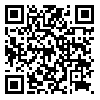1. Lucas-Carrasco R, Eser E, Hao Y, McPherson KM, Green A, Kullmann L. The quality of care and support (QOCS) for people with disability scale: development and psychometric properties. Res Dev Disabil. 2011;32(3):1212–25. [
DOI]
2. Shariatmadar A, Gharavi Z. Comparison of cognitive distortions in individuals with physical-movement handicap with high and low distress tolerance. Journal of Counseling Research. 2015;14(55):44–55. [Persian] [
Article]
3. Ghorbani N. Az khatt ta mosallase ta’aroz [From line to conflict triangle].Tehran: Binesh-e-No Pub; 2016. [Persian]
4. Kring AM, Sloan DM. Emotion regulation and psychopathology: a transdiagnostic approach to etiology and treatment. Hasani J, Akrari M. (Persian translator). Tehran: Ketab-e-Arjmand Pub; 2020.
5. Miranda D, Gaudreau P, Debrosse R, Morizot J, Kirmayer LJ. Music listening and mental health: variations on internalizing psychopathology. In: MacDonald R, Kreutz G, Mitchell L; editors. Music, health, and wellbeing. Oxford University Press; 2012. [
DOI]
6. Gross JJ, Muñoz RF. Emotion regulation and mental health. Clinical Psychology: Science and Practice. 1995;2(2):151–64. [
DOI]
7. Garnefski N, Kraaji V. Do cognitive coping and goal adjustment strategies used shortly after myocardial infarction predict depressive outcomes 1 year later? J Cardiovasc Nurs. 2010;25(5):383–9. [
DOI]
8. Dadfarnia S, Hadianfard H, Rahimi C, Aflakseir A. Predicting depression based on cognitive emotion regulation strategies. Tolooebehdasht Journal. 2020;19(1):32–47. [Persian] [
Article]
9. Khedmati N. The relationship between rumination and difficulty of emotion regulation with self-harm behaviors in students. Rooyesh-e-Ravanshenasi Journal. 2020;8(11):19–26. [Persian] [
Article]
10. Leahy RL. A model of emotional schemas. Cogn Behav Pract. 2002;9(3):177–90. [
DOI]
11. Leahy RL, Tirch D, Napolitano LA. Emotion regulation in psychotherapy: a practitioner's guide. First edition. New York: The Guilford press; 2011.
12. Leahy RL. Emotional schema therapy. First edition. New York: The Guilford Press; 2015.
13. Leahy RL. Resistance: an emotional schema therapy (EST) approach. In: Simos G; editor. Cognitive behaviour therapy a guide for the practising clinician. Volume 2. First edition. Routledge; 2008.
14. Masumi Tabar Z, Afsharriniya K, Amiri H, Hosseini SA. The effectiveness of emotional schema therapy on emotional regulation problems and marital satisfaction of maladaptive women of the first decade of life. Journal of Psychological Science. 2021;19(95):1497–506. [Persian] [
Article]
15. Mohammadi H, Sepehri Shamloo Z, Asghari Ebrahim Abad MJ. The effectiveness of group emotional schema therapy on decreasing loneliness and rumination in divorced women. Journal of Woman and Family Studies. 2019;7(2):15–36. [Persian] [
Article]
16. Linehan MM. DBT Skills training manual. Second edition. New York: The Guilford Publications; 2014.
17. Rizvi SL, Thomas MC. Dialectical behavior therapy. In: Friedman HS; editor. Encyclopedia of mental health. Second edition. Cambridge, US: Academic Press; 2016. [
DOI]
18. Marra T. Dialectical behavior therapy in private practice: a practical and comprehensive guide. Oakland, CA: New Harbinger Publications; 2005.
19. Kazemi A, Peyman A, Kazemie Rezaei SV, Salehi A. Emotion regulation training based on dialectical behavior therapy effectiveness on reducing students' anxiety and anger Armaghane-Danesh. 2020;25(4):451–65. [Persian] [
Article]
20. Safari A, Aftab R. The effectiveness of online dialectical behavior therapy on the emotion regulation difficulties, guilt feeling and dissociative symptoms in depressed people. J Appl Psychol. 2021;15(4):206–179. [Persian] [
DOI]
21. Parvaneh P, Khalatbari J, Saeedpoor F. Comparison of the effectiveness of dialectical-behavioral and cognitive-behavioral therapy on irrational beliefs, emotion regulation, and impulsive behaviors of high school female students. Community Health Journal. 2021;14(2):69–81. [Persian] [
Article]
22. Delavar A. Ehtemalat va amare karbordi dar ravan shenasi va oloume tarbiati (ba tajdide nazar va ezafat) [Probability and applied statistics in psychology and educational sciences (with revisions and additions)]. Tehran: Roshd Pub; 2010. [Persian]
23. Garnefski N, Kraaij V, Spinhoven PH. Negative life events, cognitive emotion regulation and emotional problems. Perso Individ Dif. 2001;30:1311-27. [
DOI]
24. Garnefski N, Kraaij V. The Cognitive Emotion Regulation Questionnaire. Eur J Psychol Assess. 2007;23(3):141–9. [
DOI]
25. Hasani J. The psychometric properties of the Cognitive Emotion Regulation Questionnaire (CERQ). Journal of Clinical Psychology. 2011;2(3):73–84. [Persian] [
Article]
26. McKay M, Wood JC, Brantley J. The dialectical behavior therapy skills workbook: practical DBT exercises for learning mindfulness, interpersonal effectiveness, emotion regulation, and distress tolerance. First edition. Oakland: New Harbinger Publications; 2007.
27. Astaneh R, Mirzaian B, Hassanzadeh R. The effectiveness of skill training based on dialectical behavior therapy on emotional regulation, social avoidance and distress in adolescents with social anxiety disorder. Journal of Torbat Heydariyeh University of Medical Sciences. 2020;8(3):50–60. [Persian] [
Article]
28. Garnefski N, Kraaij V. Specificity of relations between adolescents’ cognitive emotion regulation strategies and symptoms of depression and anxiety. Cogn Emot. 2018;32(7):1401–8. [
DOI]





